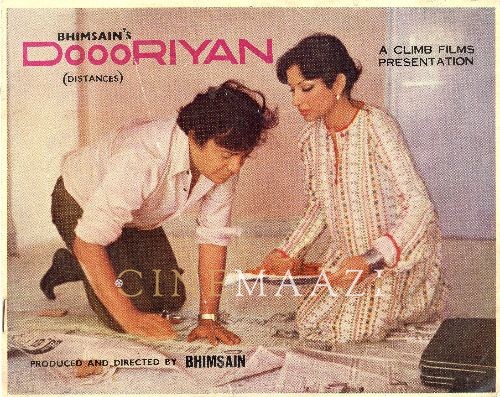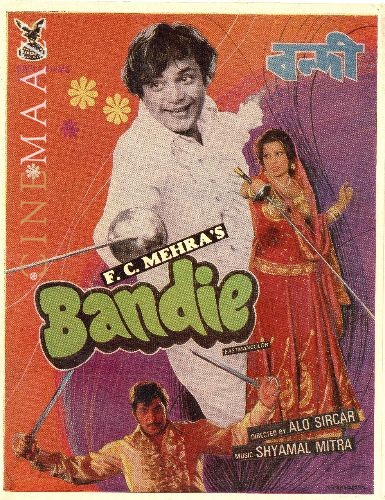Uttam Kumar

Subscribe to read full article
This section is for paid subscribers only. Our subscription is only $37/- for one full year.
You get unlimited access to all paid section and features on the website with this subscription.
Not ready for a full subscription?
You can access this article for $2 , and have it saved to your account for one year.
- Real Name: Arun Kumar Chatterjee
- Born: 3 September, 1926 (Kolkata, West Bengal)
- Died: 24 July, 1980 (Kolkata, West Bengal)
- Primary Cinema: Bengali
- Spouse: Supriya Devi , Gauri Chatterjee
- Children: Gautam Chatterjee
The Partition of India brought with it untold horrors of communal violence, massive displacement of populations, crises of food and habitation, as well as a fissure in the national identity. One of the effects of this traumatic event was the final death knell of the studio system in the Bengali film industry. Already with decreasing capital, migration of artistes to Bombay, new censorship measures the studios of Kolkata were struggling - with the loss of the vast markets of East Bengal their decline was all but confirmed. By the 50s, it became almost impossible for Bengali cinema to produce an 'All India film' like it could succesfully in the 30s and 40s. Bengali cinema was in need of a revival and particularly in need of a star, the likes of who had come to dominate the Hindi film industry in lieu of the studios. It found that star in Arun Kumar Chatterjee, or as as he came to be known as - Uttam Kumar.
Born on 3 Spetember, 1926, he was lovingly called Uttam by his maternal grandmother. Acting was in the air from his childhood, as his family used to run an amateur theatre troupe called Suhrid Samaj. As he grew older he also excelled in swimming, wrestling, horse-riding and other activities. Determined to become an actor, he also took up singing lessons from Nidan Banerjee. He worked as a clerk in the Port Commissioner's office to sustain himself, also doubling as a music teacher. After struggling for sometime in the theatre scene (during which time he acted in Star Theatre's production Shyamali), he received an offer to act in a Hindi film called Mayador in 1947. Unfortunately the film was never completed. He made his debut with Nitin Bose's Drishtidaan (1948). But the film failed at the box office. In this film he had been credited as Arun Kumar. The first film to credit him as Uttam Kumar was Sahajatri (1951). Initially unsuccessful as an actor, his luck turned in 1952 with the success of Basu Parivar. An appropriation of a realist theme in a commercial form, it was indicative of the kind of films Kumar would become known for. Nirmal Dey would cast him again in Sharey Chuattar (1953) which would become the first big hit of his career and also his first film opposite Suchitra Sen. The film was mainly driven by its wonderful cast of comic actors, mainly Tulsi Chakraborty and Molina Devi. But the success of the Uttam-Suchitra duo hailed the advent of a new star pairing for commercial cinema, which was confirmed the very next year by the huge success of Agnipariksha (1954).
The Uttam-Suchitra films have come to define an era of Bengali popular melodrama. Kumar's acting in these films was marked by his shunning of the theatrical mode of acting. These films, according to historian Sharmistha Gooptu, were often modeled on Hollywood commercial cinema, but presented ethical dilemmas easily identifiable for the Bengali middle class. The Uttam-Suchitra films not only led to a commercial revival of the popular Bengali film, but also shaped its major narrative trends. As Sayandeb Choudhury notes, faced with a rapidly changing society and economy, these films had to address these issues and could never be completely escapist. At the core of all this was Uttam Kumar's gentle charisma and that unforgettable smile, forming a star image that could sustain the various often contradictory strains of the middle class consciousness. Working with the likes of Ajoy Kar, Nirmal Dey, Niren Lahiri, Chitta Bose, Sushil Majumdar, Asit Sen, the collectives Agradoot and Agragami, he enjoyed the most sustained successful commercial run in Bengali film history. Other than Suchitra Sen, he formed successful pairings with Sabitri Chatterjee, Supriya Chowdhuri and Arundhati Devi. Some of his notable films during this period were Ora Thake Odhare (1954), Sabar Uparey (1955), Sagarika (1956), Shilpi (1956), Pathe Holo Deri (1957), Harano Sur (1957), Har Jeet (1957), Indrani (1958), Khelaghar (1959), Bicharak (1959), Marutirtha Hinglaj (1959), Saptapadi (1961), Jhinder Bandi (1961), Bhranti Bilas (1963), Lal Pathar (1964), Jotugriha (1964), Thana Theke Aschi (1965), Kal Tumi Aleya (1966), Nishi Padma (1970) among many others. These films were also significant in bringing Bengali literary adaptations back into prominence.
From the 60s, Kumar started taking on more sombre characters, in both commercial and art films. This journey culminates in one of his most famous performances as the troubled superstar Arindam Mukherjee in Satyajit Ray's Nayak (1966). This was followed by him winning the inaugural National Award for Best Actor for his roles in Antony Firingee (1967) and Chidiakhana (1967). He also won six BFJA Awards for Best Actor in his lifetime. Bengali fandom at this time had been divided between the camps of Uttam Kumar and Soumitra Chatterjee, but even Chatterjee accepted that he never possessed the star aura that Kumar had. He had already turned producer in the 50s, and 1966 marked his debut as director as well with Sudhu Ekti Bochor. He later directed films like Ban Palashir Padabali (1973) and Kalankini Kankabati (1981). As music director, he worke din two films - Kal Tumi Aleya (1966) and Sabyasachi (1977). He also attempted a foray into Hindi cinema with Chhotisi Mulaqat (1967), but the film was a disaster. His only successful Hindi film was the Shakti Samanta bilingual Amanush (1975). According to Gourangaprasad Ghosh, his failure in Hindi cinema resigned him to accepting run-of-the-mill romances. Still an icon in Bengal he appeared in several successful films in the 70s.
In 1980 he sufffered a stroke while filming Ogo Badhu Sundari and passed away on 24 July. The city of Kolkata came to a standstill in mourning, as thousands thronged to pay their respects to the Bengali matinee idol of the century.
He had been married to Gauri Chatterjee in 1941 and the couple had a son, Gautam Chatterjee. But he later grew close to his co-star Supriya Devi and left his house in 1963 to live with her.
Years after his passing, Uttam Kumar's name carries considerable cultural and political currency in Bengal. He had established the organisation Shilpi Sangshad to look after the interests of struggling cinema artistes and it is still active. A metro station and a theatre have been named after him. The name of Albert Road was changed to Uttam Kumar Sarani. A television series called Mahanayak based on his life was made in 2016. In the Bengali consciousness, memories of the Mahanayak are still associated with the golden era of Bengali cinema, making him a cultural icon at par with Rabindranath Tagore and Subhash Chandra Bose.
References
Gooptu, Sharmishtha. Bengali Cinema: An Other Nation. New Delhi: Roli Books, 2010.
Chowdhury, Maitreyee B. Uttam Kumar and Suchitra Sen: Bengali Cinema's First Couple. Noida: Om Books, 2013.
Encyclopaedia of Indian Cinema. Ed. Ashish Rajadhyaksha and Paul Willemen. New Delhi: Oxford University Press, 1998.
Chowdhury, Sayandeb. "The Heroic Laughter of Modernity: The life, cinema and afterlife of a Bengali Cinema Idol", Film International, Issue 58-59. pp.82 - 91.
-
Filmography (46)
SortRole
-

Desh Premee 1982
-
Kalankini Kankabati 1981
-

Plot No 5 1981
-

Doooriyan 1979
-

Bandie 1978
-

Kitaab 1977
-
Anand Ashram 1977
-
Priyo Bandhabi 1975
-
Amanush 1975
-
Bikaley Bhorer Phul 1974
-

Jadu Bansha 1974










.jpg)



